DEU

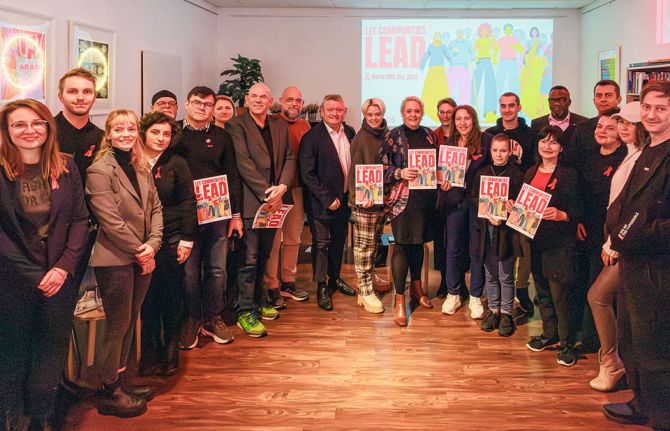
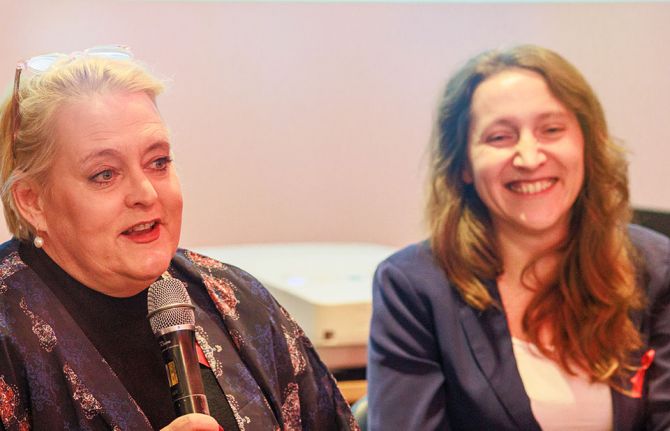
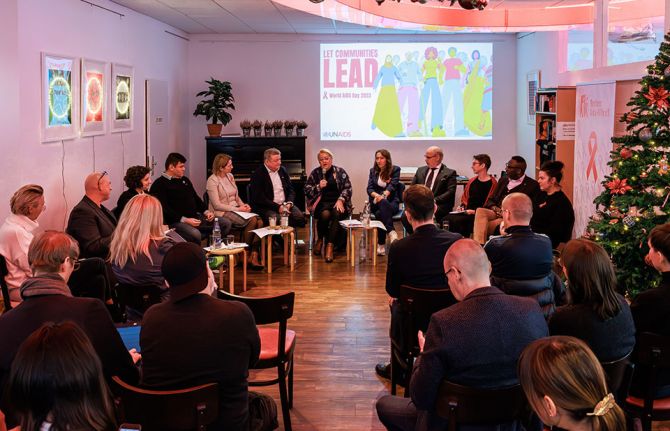
Feature Story
UNAIDS commemorates World AIDS Day in Berlin alongside communities delivering life-saving HIV services in Germany and Ukraine
30 November 2023
30 November 2023 30 November 2023Since the beginning of the war in Ukraine, communities of people living with and affected by HIV have been at the forefront of ensuring the continuity of life-saving HIV services, both for those who remained in Ukraine and for those arriving in Germany as refugees.
At a special World AIDS Day event in Berlin co-hosted by UNAIDS and 100% Life Ukraine, community representatives and civil society activists thanked the German government and UNAIDS for their support and spoke about the continued challenges they face.
“Our journey exemplifies how the strength of perceived minorities and real community leadership can drive life-saving programmes and innovations that can impact the lives of millions of people,” said Valeriia Rachinska, Director of Human Rights, Gender and Communities at 100% LIFE Ukraine. “None of this would be possible without the support of international partners and donors. Global solidarity and support from our partners are the chance for a fair and thriving tomorrow for all, especially those living with HIV.”
100% LIFE is the largest patient-led organization in Ukraine which has as its mission to fight for life. The Network works with patients and for patients, including the representation of the interests of people living with HIV in 25 regions of Ukraine.
Since the beginning of the war in Ukraine, Germany has donated €1,050,000 in emergency funding to UNAIDS, empowering the provision of critical support to people living with and affected by HIV in Ukraine, Poland and Moldova. This includes providing temporary accommodation, humanitarian assistance, social protection, primary health care and testing for HIV, hepatitis C, STIs and tuberculosis. The emergency fund also covered the enrollment of people in HIV prevention and treatment programmes, offering comprehensive care and support.
Among the speakers at the World AIDS Day event was Silke Klumb, CEO of the German AIDS Federation, who underlined the importance of the partnership between government and civil society in ensuring continued access to HIV prevention, treatment and care services for people affected by the war in Ukraine.
"Community-led responses have been and continue to be critical in the HIV response, both in Germany and globally. Thanks to public funding Deutsche Aidshilfe has been able to engage in community-led prevention, counselling, testing, care, and support for 40 years now. Upon this foundation and through the broad network in Ukraine, Eastern Europe and Central Asia, Germany’s community-led organizations under the umbrella of Deutsche Aidshilfe were able to act immediately to Russia’s full-scale invasion of Ukraine,” said Ms Klumb. ”Over the last 18 months, we provided support, information, translations to people fleeing the war and linked them to care. Platforms such as self-help conferences and other meetings helped to strengthen the communities of people living with and affected by HIV. Deutsche Aidshilfe is committed to continue putting the communities at the centre of our work.”
During the event, UNAIDS Deputy Executive Director of Policy, Advocacy and Knowledge, Christine Stegling, presented the new UNAIDS World AIDS Day report Let Communities Lead. The report shows how communities have been the driving force for progress in the global fight against HIV. It shows that investing in community-led HIV programmes can have transformational benefits.
“Since the earliest days of the AIDS pandemic, community leadership has driven life-saving access to HIV treatment and prevention. Continued progress against HIV/AIDS in Ukraine - despite the war and its resulting refugee crisis - is the direct result of Ukrainian and German community leadership. A community-led response is well-positioned to maintain continuity of HIV prevention and treatment services, especially in times of crisis,” said Ms Stegling. “Continuity of HIV care is essential for achieving our ultimate goal of ending AIDS as a public health threat by 2030. UNAIDS thanks all community leaders who stepped up in these challenging times and we thank nations like Germany who understand the value of investing in a community-led response to HIV/AIDS - especially in times of war and other crises.”
The event was moderated by Peter Wiessner of Action against AIDS Germany.
Region/country
Related
 U=U can help end HIV stigma and discrimination. Here’s how
U=U can help end HIV stigma and discrimination. Here’s how

27 February 2025
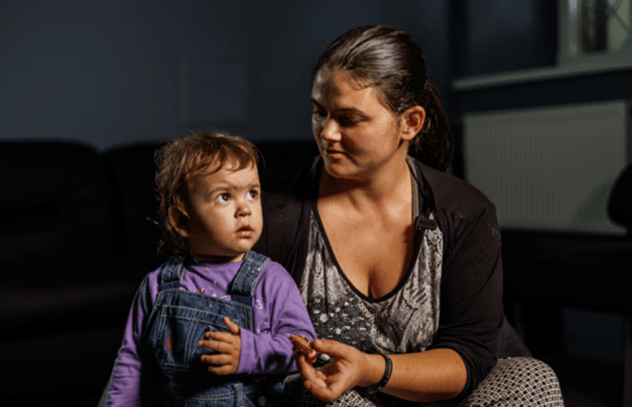 Three Years On: From crisis to prospective recovery
Three Years On: From crisis to prospective recovery

20 February 2025

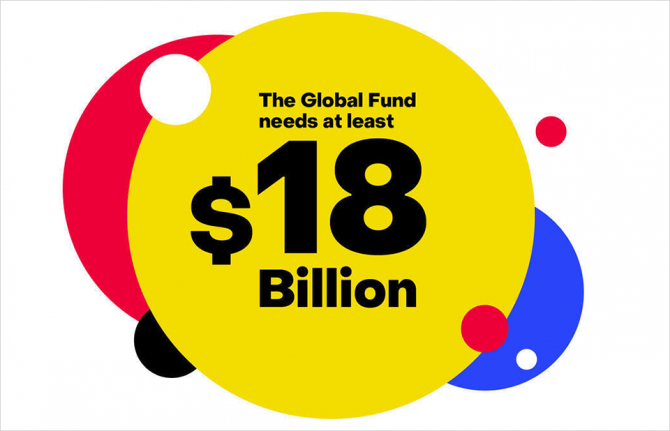
Press Statement
UNAIDS commends Germany’s pledge of €1.3 billion for the 7th Global Fund Replenishment
08 September 2022 08 September 2022GENEVA, 8 September 2022—UNAIDS warmly welcomes Germany’s pledge of €1.3 billion for the 7th replenishment of the Global Fund to Fight AIDS, Tuberculosis and Malaria, an increase of 30% on the country’s contribution of €1 billion made in 2019. The announcement is a significant step towards reaching the goal of raising at least $18 billion when President Biden hosts the 7th Global Fund Replenishment Conference in New York later this month.
“This announcement demonstrates Germany’s continued leadership in global health, its commitment to multilateralism and its determination to save millions of lives by ending AIDS, tuberculosis and malaria by 2030,” said UNAIDS Executive Director, Winnie Byanyima. “This is an investment in young people’s health and wellbeing—particularly of young women and girls —and it will strengthen global security by instilling resilience into systems needed to protect all of us from emerging health threats. I look forward to other donors matching Germany’s increase in funding.”
The United States is the Global Fund’s largest donor and has pledged $6 billion for the organization’s 7th replenishment contingent on the $18 billion target being fully met. Last week, Japan announced that it was increasing its contribution to the Global Fund by 30% to more than $1 billion.
The Global Fund Replenishment Conference takes place from 19—21 September at a time when funding for the HIV response remains under intense pressure. In 2021, international resources available for HIV were 6% lower than in 2010. Overseas development assistance for HIV from bilateral donors other than the United States has fallen by 57% over the last decade. The HIV response in low- and middle-income countries is US$8 billion short of the US$29 billion needed by 2025 to get the world on track to end the AIDS pandemic as a global health threat by 2030.
To maximize the effectiveness of their investments to the Global Fund, donors are also being urged to fully fund the Joint United Nations Programme on HIV/AIDS. UNAIDS is present in 70 countries worldwide working in partnership with governments, civil society and communities, collecting the data that shapes the HIV response, advocating for the reversal of harmful laws and policies to create an enabling legal environment, working for an end to HIV-related stigma and discrimination, and challenging the inequalities driving the HIV pandemic among vulnerable and marginalized groups of people.
UNAIDS latest report In Danger, shows that recent crises have knocked the global AIDS response off track, with HIV infections on the rise in 38 countries. It shows also that the end of AIDS by 2030 is possible, if leaders act boldly together.
The announcement of Germany’s increase was made in Berlin by the Federal Minister for Economic Cooperation and Development, Svenja Schulze, at the Get Back On Track international conference organized by civil society organizations, including Action Against AIDS Germany.
UNAIDS
The Joint United Nations Programme on HIV/AIDS (UNAIDS) leads and inspires the world to achieve its shared vision of zero new HIV infections, zero discrimination and zero AIDS-related deaths. UNAIDS unites the efforts of 11 UN organizations—UNHCR, UNICEF, WFP, UNDP, UNFPA, UNODC, UN Women, ILO, UNESCO, WHO and the World Bank—and works closely with global and national partners towards ending the AIDS epidemic by 2030 as part of the Sustainable Development Goals. Learn more at unaids.org and connect with us on Facebook, Twitter, Instagram and YouTube.
Region/country

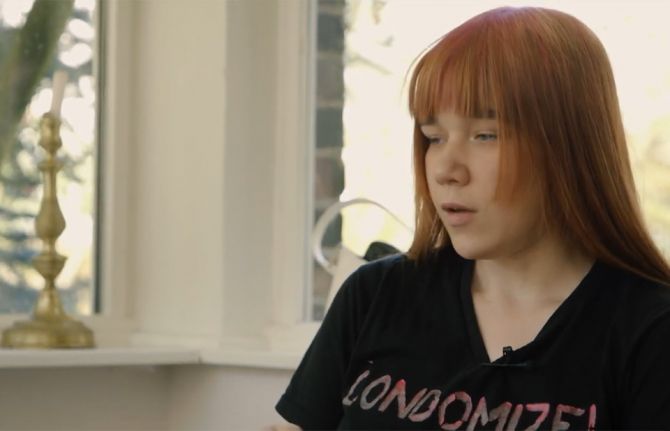
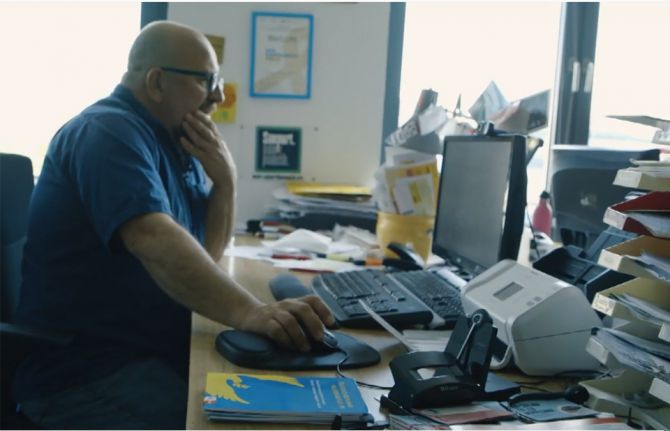
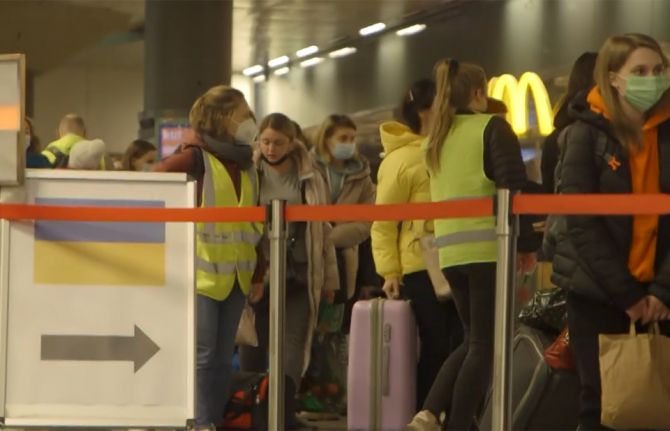
Feature Story
Helping Ukrainian refugees with HIV treatment and support in Berlin
20 May 2022
20 May 2022 20 May 2022More than 600 000 Ukrainian refugees arrived in Germany since the war broke out. Among them many people living with HIV – mostly women.
In the beginning many needed shelter and then there were lots of requests about obtaining HIV treatment. Many refugees had left their supply behind or took the bare minimum.
Vasilisa Sutushko, who was born with HIV, arrived in Berlin at the beginning of March and had only one month of HIV medicine with her. She also had no clue navigating the German health system. A local NGO, Berliner AIDS Hilfe, one of Germany’s oldest HIV organizations, was flooded with an influx of calls for help.
“I got these pills for €10 for three months,” Ms Sutushko said, pointing at a box of HIV treatment. “When I came to Berlin, I had to understand whether I received medicine for myself here for free or for a fee,” she said.
Unlike in her native country, she explained, in Germany you need a prescription for almost all medicines.
“In Ukraine, I can get any pills I need without any problems at the pharmacy,” Ms Sutushko said.
Berliner Aids-Hilfe’s migration consultant, Sergiu Grimalschi, said when the first refugees began to arrive there were few organized structures, so they had to improvise across the country. “We had to find an urgent solution,” he said.
They helped countless refugees with medicine, paperwork, housing, and other pressing health issues.
According to Berliner AIDS Hilfe, most of the refugees living with HIV won’t be able to go back until the bombed medical facilities are rebuilt.
Ms Sutushko, founder of Teens Ukraine – an NGO that helps young people who live with HIV- and others are now trying to set up a network to further help people living with HIV. Stigma and discrimination in Ukraine regarding one’s HIV status has made many refugees hesitant about seeking help or open about living with HIV in their adopted countries. "I'm happy to see people like me here who need help, I can also be helpful," she said.
UNAIDS estimates that 260 000 Ukrainians live with HIV. Up to 30 000 fled their country since the start of the war and need HIV treatment.
Interrupting treatment, even temporarily, can lead to drug resistance and increased risk of progression to AIDS.
Watch: Helping Ukrainian refugees with HIV treatment and support in Berlin
Region/country
Related

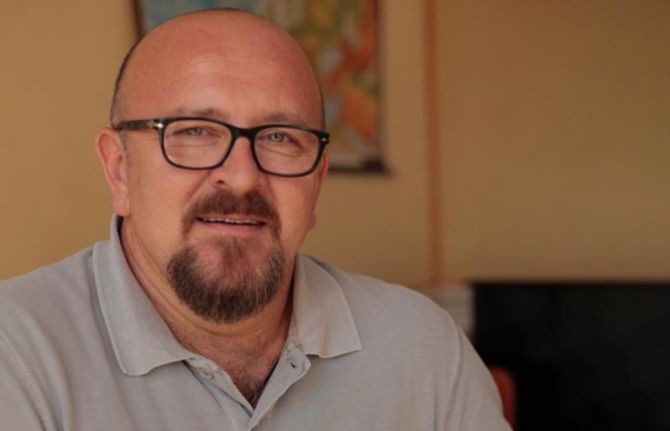
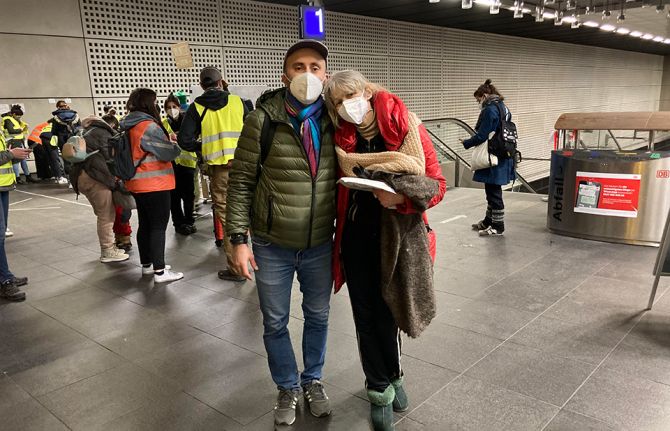
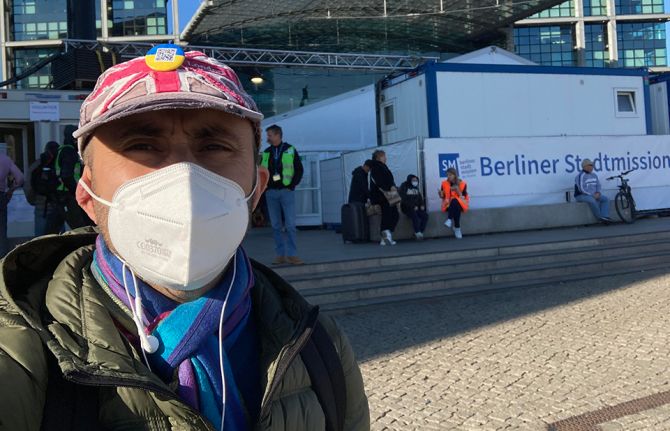
Feature Story
Welcoming Ukrainian refugees in Germany: big test for all
21 April 2022
21 April 2022 21 April 2022The start of the Ukrainian war fifty days ago surprised many people including Berliner Aids-Hilfe’s migration consultant. Sergiu Grimalschi, along with his colleagues, has been thrust at the forefront of helping thousands of Ukrainian refugees coming to Germany, primarily those living with HIV.
Mr Grimalschi, a professional interpreter, came to Berlin from Romania in the early 1990s. For the past twenty-five years, he has been working on the HIV response primarily with migrants and is currently employed by Germany’s oldest HIV organization. From 2006 to 2012 he helped countries in Eastern Europe and Central Asia (EECA) develop HIV health services and worked in Ukraine, Belarus, Russia, and Poland.
UNAIDS spoke with Mr Grimalschi about the challenges Ukrainian refugees living with HIV face in Berlin.
Question: Sergiu, many refugees living with HIV in Germany are now coming to you directly. Were you able to prepare for this ahead of time?
Answer: No. No one was prepared and, to be honest, the war was a complete surprise for us, and for me personally. Eastern Europe has been a priority for my organization since 2010. We all speak eastern European languages and have stayed informed about the situation in the region. So, when the war started, I did a simple thing that turned out to be decisive. I wrote one mass email to an EECA group saying that anyone living with HIV fleeing from the war to Germany could contact me or my colleague by phone. First, I got called by colleagues from Moldova, with whom I worked closely during the COVID-19 pandemic when we provided medicines to people stuck in Europe. Then various Ukrainian organizations started contacting me. They continued to share my email and within a week the Berliner Aids-Hilfe numbers were on all social networks and on all Telegram channels.
Question: Many refugees living with HIV fled to Europe, in particular Germany, because they believed that everyone here has access to HIV treatment and services. True or false?
Answer: Yes, everyone has access except migrants without health insurance. That has changed only recently.
In Berlin, for example, every person, including undocumented and uninsured migrants could access treatment but only since the end of 2018.
All this was due to the fact that people without health insurance in Germany cannot be treated, and the law does not take into account people without insurance. And, as you know, if you cannot be treated, you die. Since 2000, we focused on all possible ways to provide all people living with HIV without insurance with access to medicines and qualified medical treatment.
Addressing this issue was the most difficult and the most important task for us in many years, but we managed to solve it. And that is thanks to many years of advocacy work that we did.
Question: So tell us how you deal with influx of refugees in Germany?
Answer: It is still not so simple. Firstly, the situation is very different in different states (landers) of Germany.
Secondly, when the first refugees began to arrive, there were no really organized structures, so we had to improvise with colleagues across the country. One bad thing was for example that Ukrainian people fleeing their homes were advised to leave medicines for those who stayed in Ukraine. In the first days of the war, medicines were collected throughout Germany in order to send them to Ukraine or Poland. But after one week, a lot of people living with HIV from Ukraine were in Berlin. A few women came to me saying, ‘I have only 2 or 3 pills because I gave everything to my husband.’
We had to find an urgent solution.
We went to doctors in Berlin and found stockpiles of HIV treatment but then we ran out. Doctors wrote out prescriptions, but it was not clear how they would be covered or paid for. Only Dolutegravir, for example, which is a part of the treatment that a majority of Ukrainians living with HIV take, costs more than 700 euros here. But everyone made extra efforts– doctors, social workers, other people living with HIV – they said, 'There is a war going on.’ And eventually the German health authorities began gradually to cover treatment costs.
Many people who arrive from Ukraine still do not understand how one gets treatment in Germany. There are no big specialized centers that dispense medicine here. I explain to people: ‘we help you to get an HIV-specialized doctor in your region who gives you a prescription and then you can go to the pharmacy and get your medicine.’
In recent weeks, onlly some of the 16 German regions have been treating people without insurance, without registration, based only on the person’s passport. For the past two weeks in Berlin, doctors have been authorized to treat Ukrainian refugees just by providing photocopies of their passport and sending it to the social services to get reimbursed. A real show of human solidarity.
Question: How many people are currently receiving antiretroviral therapy in Berlin?
Answer: At the moment, about 600 Ukrainians living with HIV are in contact with me throughout Germany and 150 in Berlin. Overall, I would say about 2,000 people total but not everyone has asked for help yet because they have enough medicine.
Question: Sergiu, tell us how the war started for you?
Answer: When my mother called me from Romania on the morning of February 24 and said, ‘the war has begun,’ I asked her, ‘Mom, did you sleep badly? Stop!’ I thought she had a bad dream. I never thought that Russia would go ahead with the invasion of Ukraine.
Personally, I am very connected to Eastern Europe. My grandmother left Russia in 1918, my grandfather was from Chernivtsi, which means that theoretically, he could have been Ukrainian if he had not left in 1940. I have a lot of very good friends, relatives, and colleagues with whom I worked there so this is terribly painful for me.
Question: Sergiu, as I understand it, you not only help refugees with treatment but also help out with housing and other things?
Answer: Yes, of course, we help with the refugee registration and access to social aid services, health insurance, psychological support in their language and everything that they need. We also advise people against going to the countryside. It is better for people living with HIV or who need substitution therapy to stay in Berlin or other big cities, because there are better health facilities.
I and my colleagues and friends try to help people with accommodation and clothing. I have a friend, a Romanian doctor, whose house was empty. I asked her if she wanted to help. Now six Ukrainian families live in her house. Another German friend gave 2,500 euros to women from Ukraine for urgent needs. Of course, I am accountable for all this money, but this is a personal, private initiative. One of my friends, a lawyer, bought iPads for many refugee children. He says children need to study so now they can go online.
Question: Amazing work Sergiu... What keeps you going?
Answer: I am impressed by all this human solidarity and I hope that all this horror will end shortly...This is a big test for all of us.
Region/country
Related
 Three Years On: From crisis to prospective recovery
Three Years On: From crisis to prospective recovery

20 February 2025


Press Statement
UNAIDS strengthens partnership with Germany and opens a new office in Bonn
07 April 2022 07 April 2022GENEVA, 7 April 2022—The German Federal Government has agreed to host a new UNAIDS office in Bonn. The agreement is part of Germany’s commitment to reinforce its partnership with the United Nations and part of UNAIDS’ commitment to realign its work to the new Global AIDS Strategy 2021–2026: End Inequalities, End AIDS.
“UNAIDS welcomes this important support by Germany,” said Winnie Byanyima, Executive Director of UNAIDS. “Germany is continuing to demonstrate its commitment to end AIDS through shared responsibility and global solidarity, and we look forward to working ever more closely into the future towards our common goals.”
The UNAIDS office will house UNAIDS’ management support functions, including People Management, Information and Communications Technology, Finance and the Independent Evaluation Office. Operations will begin in mid-2022 and will be part of the UNAIDS Secretariat’s more geographically distributed “global centre”. Approximately 45 UNAIDS staff will be working in Bonn, a location that also hosts United Nations organizations that include the United Nations Framework Convention on Climate Change, the United Nations Volunteers programme, the United Nations Global Centre for Human Resources Services and the United Nations System Staff College Knowledge Centre for Sustainable Development. It will become the third largest United Nations office in Bonn and joins 25 other United Nations entities with a presence in the city.
“With this relocation of UNAIDS staff to Bonn, Germany shows its commitment to supporting the important work of the Joint United Nations Programme on HIV/AIDS in the global AIDS response and reflects Germany’s commitment to global health overall. We hope that this move as part of the realignment process will contribute to a more effective and cost-efficient UNAIDS. We welcome the United Nations staff to Bonn,” said the German Minister of Health, Karl Lauterbach.
The Government of Germany, parliamentarians, civil society and other partners in Germany have long shown commitment to the global HIV response and to global health and health security. Germany has provided regular contributions to UNAIDS and was the third largest donor in 2020, investing a total of almost US$ 30 million in that year, and pledged US$ 1 billion to the Global Fund to Fight AIDS, Tuberculosis and Malaria at its last replenishment.
A valued partner of UNAIDS, the Government of Germany is firmly committed to ending AIDS as a public health threat by 2030 and has invested significant resources to ensure that no one is left behind. In 2020, Germany contributed an additional €20 million to UNAIDS above its core contribution to strengthen the response to HIV during the COVID-19 pandemic.
UNAIDS
The Joint United Nations Programme on HIV/AIDS (UNAIDS) leads and inspires the world to achieve its shared vision of zero new HIV infections, zero discrimination and zero AIDS-related deaths. UNAIDS unites the efforts of 11 UN organizations—UNHCR, UNICEF, WFP, UNDP, UNFPA, UNODC, UN Women, ILO, UNESCO, WHO and the World Bank—and works closely with global and national partners towards ending the AIDS epidemic by 2030 as part of the Sustainable Development Goals. Learn more at unaids.org and connect with us on Facebook, Twitter, Instagram and YouTube.
Contact
UNAIDS GenevaSophie Barton-Knott
tel. +41 79 514 68 96
bartonknotts@unaids.org
UNAIDS Media
communications@unaids.org
Region/country

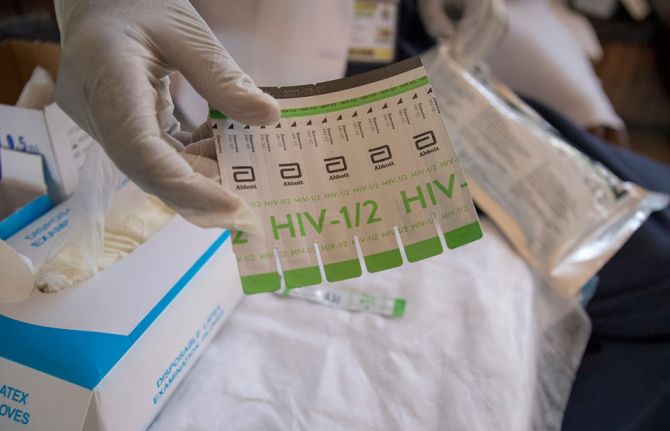

Press Statement
UNAIDS welcomes investments from Sweden and Germany for the responses to HIV and COVID-19
18 December 2020 18 December 2020GENEVA, 18 December 2020— UNAIDS strongly welcomes the announcement by Sweden at the 47th meeting of UNAIDS Programme Coordinating Board to renew its annual funding commitment to UNAIDS of SEK300 million in core funding for 2021, equivalent to 36 million USD, demonstrating the country’s continued leadership in the global AIDS response. In making the announcement, Sweden underscored UNAIDS role in working for sexual and reproductive health and rights.
UNAIDS also welcomes Germany’s announcement, at the same meeting, of its decision to invest an additional €5 million in UNAIDS complementary responses to the HIV and COVID-19 epidemics next year. This builds on the country’s contribution of €20 million to UNAIDS’ HIV and COVID-19 response in June this year and is on top of Germany`s annual contribution to UNAIDS of €5 million. In making the announcement, Germany recognized UNAIDS’ outstanding work in responding to the colliding epidemics of HIV and COVID-19 and called on other donors to consider increasing their contributions.
“I want to thank Sweden and Germany for their strong leadership in the AIDS response as well as their confidence in and support for UNAIDS,” said UNAIDS Executive Director, Winnie Byanyima. “These contributions will allow UNAIDS to maintain our response to the HIV epidemic, while mitigating the effects of COVID-19 on vulnerable groups of people and mobilizing the AIDS response, its infrastructure and expertise against COVID-19.”

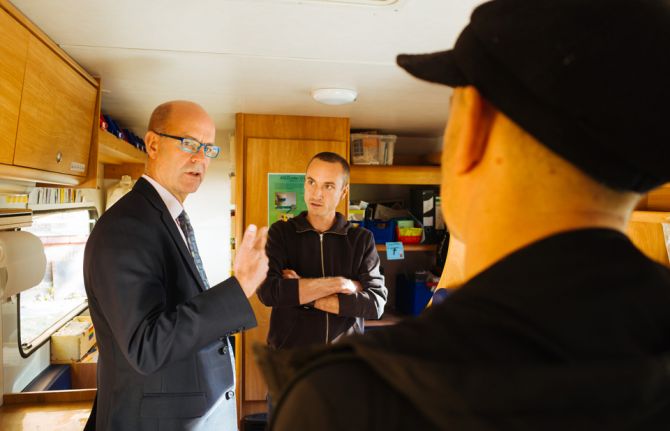
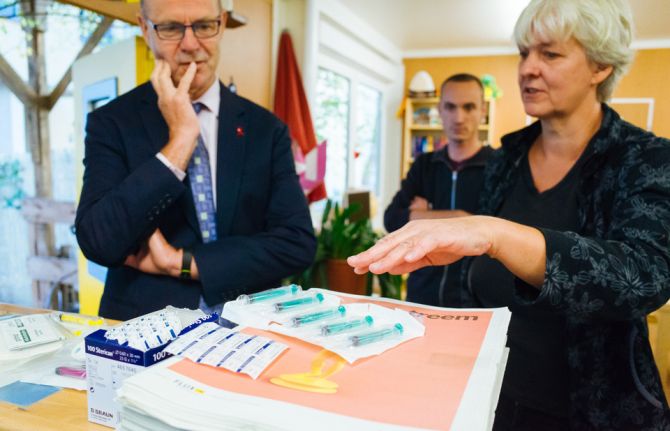
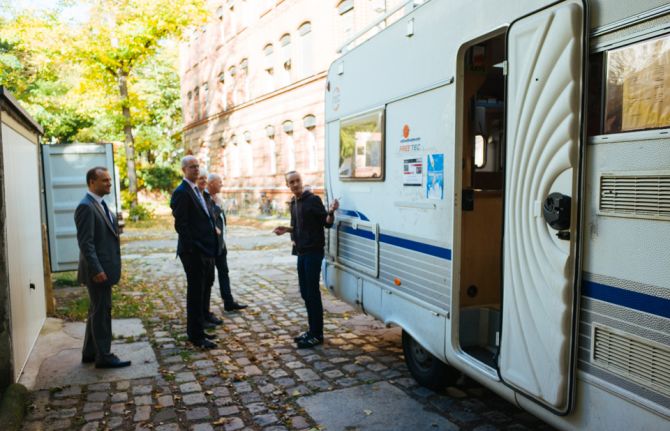
Feature Story
Germany: taking a human-rights based approach to injecting drug use
16 October 2018
16 October 2018 16 October 2018People who inject drugs often have one or more associated health issues. Drug use and mental health issues often coexist and drug use can increase the risk of contracting infections. Among people who inject drugs, for example, the risk of acquiring to HIV is 22 times greater than for people in the general population. People who use drugs are also widely stigmatized and marginalized, putting them out of reach of health and social services.
In line with Germany’s efforts to take a people-centred, human rights-based approach to health, the non-profit organization Fixpunkt has begun offering a safe haven for people who inject drugs. Fixpunkt provides a wide range of services, including support for people who are on opioid substitution therapy, counselling for mental health and social problems, basic health services, sterile injecting equipment and supervised drug consumption rooms and professional assistance in the event of overdose.
Controversial life-savers
For people who inject drugs, supervised drug consumption sites are a lifeline. They are also a critical entry point into the wider health and social support system. Currently, supervised drug consumption sites are available in six of the 15 federal states in Germany. The state of Baden-Württemberg, for example, has just decided to create the legal provisions to allow the facilities and the first supervised consumption room is about to be opened in the city of Karlsruhe.
However, in the nine other federal states legal barriers currently prevent the provision of these potentially life-saving services. “More political and financial support is needed to fulfil the real potential of safe injection sites. For people who use drugs, living on the streets, these are life-saving facilities. They often do not have access to medical, health and other social services. In these facilities they can establish contact and trust and find help to change their situation,” said Astrid Leicht, Director of Fixpunkt.
The Deputy Executive Director, a.i., of UNAIDS visited one of Fixpunkt’s mobile sites on 15 October to see the impact of the services they provide. “This is an important step forwards for Germany. By taking a people-centred approach and ensuring that people who inject drugs have access to harm reduction and other health services, such as safe injection sites, Berlin will be able to stop new HIV infections among people who inject drugs and reduce the harms related to injecting drug use. More projects like Fixpunkt are need to ensure that no one is left behind.” The biggest challenge, he learned, is that there are not enough facilities or resources to provide optimal opening hours or accompanying outreach work within the neighbourhoods and communities.
Sylvia Urban, board member of Aktionsbündnis gegen AIDS and of Deutsche AIDS-Hilfe, said, “The decisions in Baden-Württemberg and Karlsruhe are ground-breaking. We hope that the remaining states and many cities will follow. These facilities save lives and prevent HIV infections. From a public health and HIV prevention perspective, there is no good reason not to provide supervised drug consumption rooms.”
High demand in southern Germany and Bremen
Supervised drug-consumption rooms are desperately needed in, for example, Mannheim, the city with the highest number of drug-related deaths in proportion to inhabitants, as well as in Stuttgart, Munich, Nuremberg, Augsburg and Bremen, which have high numbers of preventable drug-related deaths.
Worrying situation in eastern Europe
UNAIDS and the World Health Organization recognize that supervised drug consumption facilities are a particularly important intervention. Yet, in eastern Europe there are very few facilities of this kind and in some countries, including the Russian Federation, there are virtually no harm reduction services provided at all amid a context of rising new HIV infections.
“Supervised drug-consumption facilities and harm reduction programmes are crucial components of HIV and hepatitis prevention. The tools and interventions to end the epidemics are all available, but many governments prevent their implementation,” said Sylvia Urban, from Deutsche AIDS Hilfe. “Only with services to minimize the negative health impacts of drug use can the HIV epidemic be stopped. In order to achieve this, legal and other barriers, including stigma, need to be removed.”
Resources
Region/country
Related
 Government ensures continuity of treatment in Malawi
Government ensures continuity of treatment in Malawi

10 February 2025

Feature Story
Germany strengthens its position as a global health leader
25 October 2017
25 October 2017 25 October 2017Germany has been increasingly stepping up its political and financial engagement in global health. Having made global health a priority during its presidency of the G7, Germany has continued this commitment throughout its presidency of the G20. In May 2017, Germany held the first ever meeting of the G20 ministers of health. The meeting was held in Berlin and provided an important platform for discussions and commitments around global health security, health systems strengthening and antimicrobial resistance.
Berlin itself is becoming widely recognised as a centre for global health debate, welcoming a number of important conferences and events around health, human rights and social protection. One of the most important annual events in Berlin’s global health calendar is the annual World Health Summit. This year’s Summit took place from 15-17 October and brought together 2000 participants from more than 100 countries.
UNAIDS has supported the Summit for a number of years and this year the Deputy Executive Director of UNAIDS Luiz Loures, participated in a range of sessions and panels from global health security to community health workers.
UNAIDS and German Healthcare Partnership co-organized a panel on the importance of strengthening innovation and health systems in Africa which brought together more than 100 participants from government, the private sector and regional and international organizations to explore opportunities to create firm partnerships and promote innovation.
Panellist Bernard Haufiku, Minister of Health of Namibia, said, “The concept of community health care workers is brilliant to me,” said “They are from the community, they live in the community, and they understand the community, its culture its problems.”
Other panellists included the Minister of Health of Ghana Kwaku Agyeman-Manu, Head of the Division of Health, Nutrition and Population at the African Union Commission Margaret Anyetei-Agama, Novartis Foundation Head of Global Health Portfolio Bakhuti Shengelia, and Deputy Director General of the International Atomic Energy Agency Dazhu Yang.
“We are putting a strong emphasis on boosting government commitments to strengthen health systems across the region, building the political will to address priority challenges and developing appropriate financing mechanisms to make services affordable,” said Dr Anyetei-Agama.
Also in Berlin another important symposium was taking place alongside the World Health Summit. “HIV in Eastern Europe – the unnoticed epidemic”, a symposium organized by Deutsche AIDS Hilfe, Action against AIDS Germany and Brot für die Welt brought together civil society from Eastern Europe and Germany to look at finding solutions to the challenges in the response to HIV in Eastern Europe where HIV infection rates are rising, treatment coverage is low and international funding is decreasing.
“People who use drugs, men who have sex with men and sex workers of all genders are not the problem, but part of the solution!” said Sylvia Urban, Chairwoman Action against AIDS Germany and Chairwoman Deutsche AIDS-Hilfe. “There is no alternative to including them and their actual needs in HIV-prevention and treatment strategies in Eastern Europe if those strategies are to be successful. Germanys very own HIV-prevention programs can be used as a blueprint: When the government works with communities and partners with civil society organizations, the results are great.”
Mr Loures joined the debate and voiced his concerns about Eastern Europe. “Despite all the scientific and economic progress, the HIV epidemic is continuing to grow in Eastern Europe,” said Mr Loures. “We have the tools, knowledge and medicines; however, there is a global epidemic of discrimination and without addressing this we will not be able to make the progress that is needed. Leadership and solidarity of civil society and communities from Germany and from Eastern Europe is essential.”
UNAIDS welcomes Germany’s commitment to health and encourages Germany to continue to develop its strong position as a leader in global health and will continue to work closely with Germany in our joint efforts towards ending the AIDS epidemic and achieving the Sustainable Development Goals.
Region/country
Related
 Government ensures continuity of treatment in Malawi
Government ensures continuity of treatment in Malawi

10 February 2025

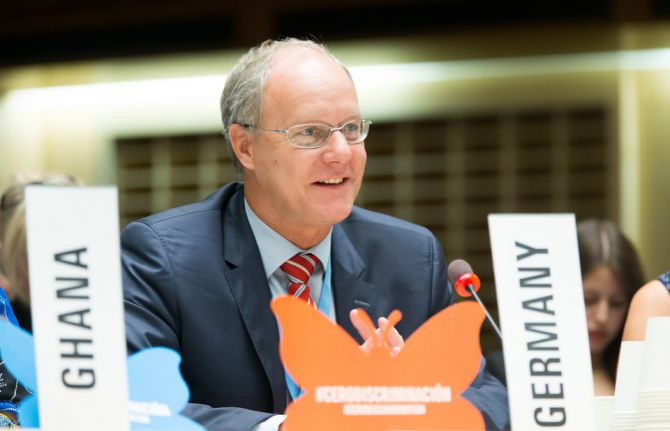

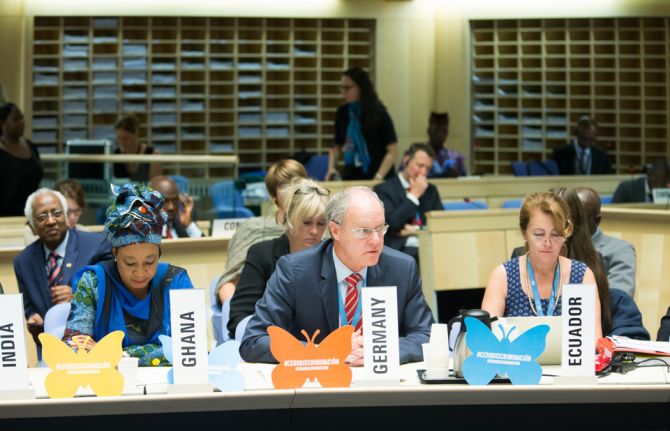
Press Release
Germany to double contributions to UNAIDS
27 June 2017 27 June 2017GENEVA, 27 June 2017—The Government of Germany has announced that it will double its funding to UNAIDS in 2017-2018, to €5 million per year. Germany made the announcement at the 40th Meeting of the UNAIDS Programme Coordinating Board, being held in Geneva, Switzerland.
“With Germany, we have a common goal of ending AIDS and a shared commitment to strengthen health systems and improve the health and well-being of people across the world,” said Michel Sidibé, Executive Director of UNAIDS. “We warmly welcome Germany’s support and its recognition of the important role that UNAIDS plays in ending AIDS and in broader global health and development efforts.”
“UNAIDS is an important partner for Germany’s health and development agenda, particularly in Africa. Increased investment in UNAIDS and the AIDS response will have a multiplier effect on the wider Sustainable Development Goal agenda,” highlighted Gerd Müller, Federal Minister of Economic Cooperation and Development, Germany.
Germany has prioritized health on the global development agenda and under its current Presidency of the Group of Twenty (G20) held the first ever G20 health ministers meeting in May 2017.
“Ending AIDS is a historic goal and I firmly believe we can reach it. We have to increase our joint efforts and UNAIDS is central to that work,” said Hermann Gröhe, Federal Minister of Health, Germany.
UNAIDS
The Joint United Nations Programme on HIV/AIDS (UNAIDS) leads and inspires the world to achieve its shared vision of zero new HIV infections, zero discrimination and zero AIDS-related deaths. UNAIDS unites the efforts of 11 UN organizations—UNHCR, UNICEF, WFP, UNDP, UNFPA, UNODC, UN Women, ILO, UNESCO, WHO and the World Bank—and works closely with global and national partners towards ending the AIDS epidemic by 2030 as part of the Sustainable Development Goals. Learn more at unaids.org and connect with us on Facebook, Twitter, Instagram and YouTube.

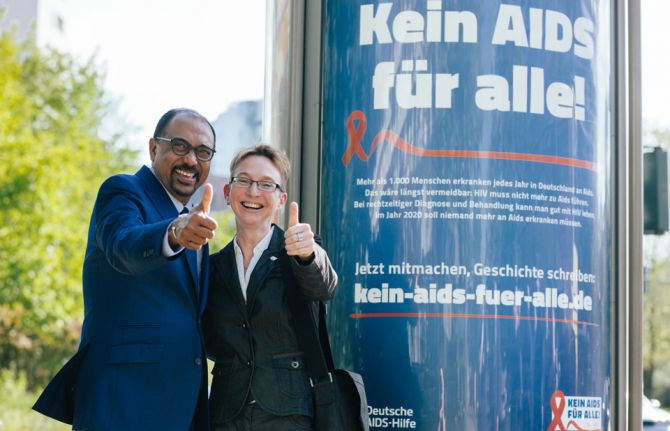
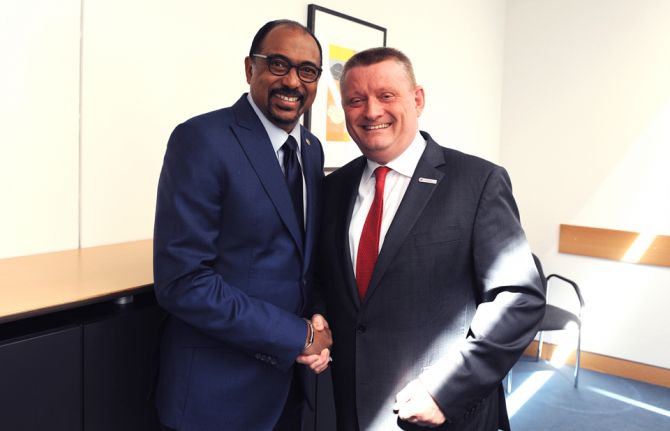
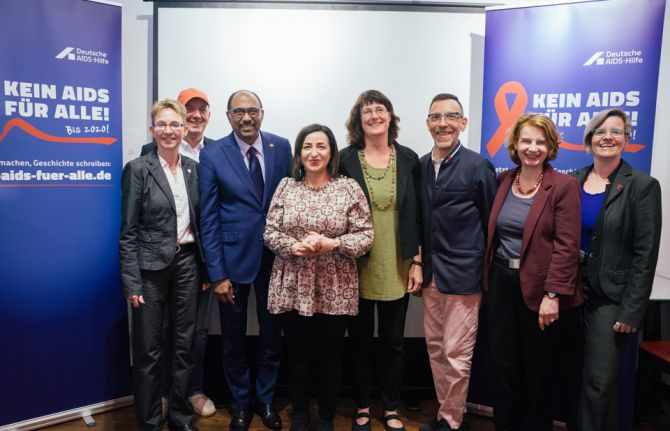
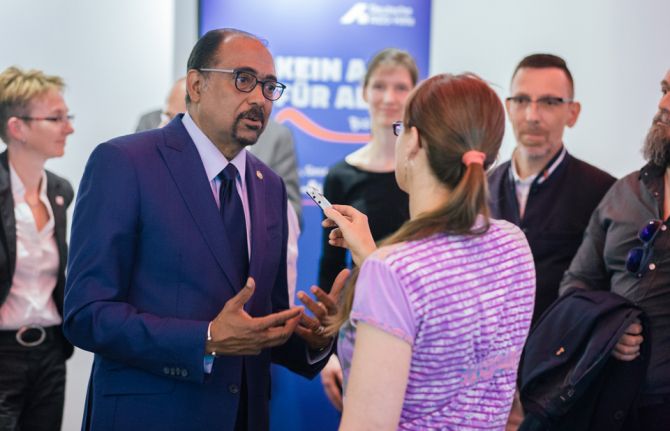
Feature Story
Germany—ready to lead by example to end AIDS
23 May 2017
23 May 2017 23 May 2017During a recent visit to Germany, the Executive Director of UNAIDS, Michel Sidibé, met with representatives of the federal government, local government, civil society, communities affected by HIV and the private sector.
Under the leadership of Chancellor Angela Merkel and the Minister of Health, Hermann Gröhe, Germany has prioritized global health on the international agenda, culminating in the first ever Group of Twenty (G20) Health Ministers Meeting, which took place in Berlin, Germany, on 19 and 20 May.
Political commitment
“Ending AIDS is a historic goal and I firmly believe we can reach it. UNAIDS has to maintain its leadership role in the global AIDS response. We have to increase our joint efforts and UNAIDS is central to that work,” said Mr Gröhe. "Health is a prerequisite for social development. This is one of the reasons why Germany made global health a priority under our G20 presidency. With this decision taken by our Federal Chancellor, Angela Merkel, a global health policy is going to be a hallmark of our country’s international responsibility. Only if we cooperate and work together, we can prepare the world for future health crises,” he added.
During the meeting, Mr Sidibé thanked the government, and particularly the Minister of Health, for their longstanding support to UNAIDS and commitment to the AIDS response. “Putting health on the agenda of the G20 and particularly holding a meeting of the G20 Health Ministers for the very first time is revolutionary,” said Mr Sidibé. “It highlights the shared understanding that quality health care is essential to social and economic stability.” They agreed on the danger of complacency and the potential reversal of gains it could bring.
Mr Sidibé also met with the Parliamentary State Secretary for the Ministry of Economic Cooperation and Development, Thomas Silberhorn, where he highlighted the critical role of UNAIDS in ending the AIDS epidemic and the impact it would have on the broader Sustainable Development Goals.
During his visit he also spoke to Bärbel Kofler, Germany’s Commissioner for Human Rights Policy and Humanitarian Aid. She said, “Access to health is a human right.” They discussed the need for continued engagement to break down discrimination and stop exclusion and prejudice, particularly for people who are vulnerable and are being left behind. Mr Sidibé emphasized that fragile communities not only exist in developing countries, but can be found the world over—from Baltimore to Bamako.
Working together to Fast-Track the AIDS response in Germany
Taking the engagement to the local level, Mr Sidibé next met with representatives of the city of Berlin, which joined the Fast-Track cities initiative in 2016. He also met the nongovernmental organization Deutsche AIDS-Hilfe, which recently launched a campaign to End AIDS in Germany by 2020, and its local branch, Berliner AIDS Hilfe, as well as the advocacy group Action Against AIDS Germany.
During the meeting, Mr Sidibé highlighted that city health systems that are inclusive and accessible have the best chance of engaging people who might otherwise be left behind. “Having a strong civil society has made a big difference in the response to HIV,” he said.
Private sector engagement
In addressing the international business community on the eve of the B20 Health Conference Mr Sidibé said. “Today’s global health challenges, including emerging pandemics and antimicrobial resistance, threaten not just individual lives, but impact social cohesion and economic development. The private sector can bring unique innovation, technologies and services and needs to be an integral part of a multisectoral response to build resilient, responsible and responsive health systems.”
As guest of honour, Mr Sidibé congratulated the winners of the newly launched German Global Health Award—the German Healthcare Partnership (GHP), Bio Deutschland and the Voice of German Industry. The initiative exemplifies how the private sector and civil society alike are needed to drive innovation in the health-care sector.
Roland Göhde, Chairman of the Board at GHP, said, “With the German Global Health Award launched in this year of Germany’s G20 presidency, we would like to underline our strong private sector commitment towards multi- and inter-sectoral partnerships engaged in health system strengthening and universal health coverage. We are partners and committed to making the world a healthier and safer place.”
Region/country
Related
 Government ensures continuity of treatment in Malawi
Government ensures continuity of treatment in Malawi

10 February 2025


